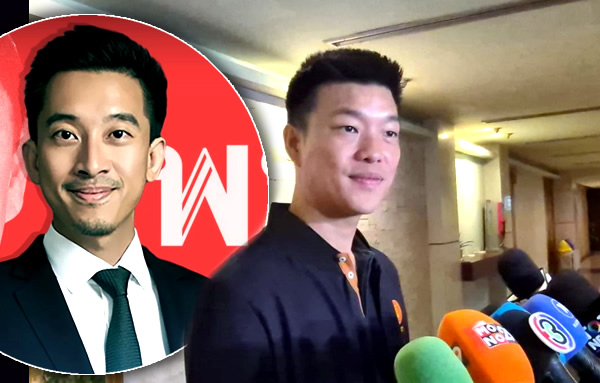Husband of Thaksin’s daughter Pintongta tipped as Pheu Thai Prime Ministerial nominee in political reset
By Joseph O’ Connor
Copyright thaiexaminer

Thailand braces as Thaksin’s son-in-law, Natthaphong Kunakornwong, is tipped as potential Pheu Thai PM while the new Anutin government faces scrutiny and the opposition prepares for a decisive four months shaping the nation’s turbulent political future.
The People’s Party leader Nattapong Ruangpanyawut, faces mounting pressure to prove that Prime Minister Anutin Charnvirakul and his newly installed government will honour the Memorandum of Understanding (MOU) that put him in power. Meanwhile, Pheu Thai is regrouping aggressively, with Thaksin loyalist Phumtham Wechayachai pushing Natthaphong Kunakornwong, husband of Thaksin’s eldest daughter Pintongta, as a potential Prime Ministerial candidate in next year’s highly anticipated General Election. The public watches in stunned bewilderment as a new government takes office, while three rival parties — Blue, Red, and Orange — battle relentlessly for control in Thailand’s unpredictable political arena, where chaos and surprises are the only constants.
To say Thai politics is in flux would now be a grave under statement. The country is entering a phase of turbulence, uncertainty, and strategic repositioning not seen in over a decade. The dramatic removal of Prime Minister Paetongtarn Shinawatra on August 29th was only the beginning. Since then, political developments have snowballed, culminating in the controversial election of conservative Bhumjaithai Party leader Anutin Charnvirakul as the new Prime Minister. Notably, this decision came from the People’s Party, once seen as a progressive force. Their support for Anutin was not just surprising—it was seismic. It signalled a sharp pivot to the right and a calculated gamble.
Meanwhile, Pheu Thai Party figurehead and former Prime Minister Thaksin Shinawatra was jailed at Bangkok’s notoriously high-security Khlong Prem Prison.
Pheu Thai faces uncertainty as Thaksin Shinawatra is jailed and Anutin Charnvirakul assumes premiership
There, reports suggest that his health is deteriorating behind bars, raising concerns. His lawyer and family have insisted that the former PM seeks no special consideration or privileges, but his age at 76 is a factor in addition to high blood pressure.
In the days that followed, tensions have deepened. Pheu Thai decisively defeated the People’s Party in a Chiang Rai by-election just last weekend. This victory was seen as a resounding public rejection of the current direction of government and the People’s Party. Consequently, dissatisfaction has grown across civil society regarding what many perceive as a “blank check” given to Anutin by the progressive party.
Significantly, on Saturday, Anutin declared that his government would last no longer than 120 days. However, political observers are sceptical. Many believe this statement may be another tactic, meant to disarm critics and buy time.
Importantly, Anutin has a track record of surprising his opponents. The signs suggest this may not be a temporary arrangement at all.
Bhumjaithai absence and constitutional court ruling raise fears of stalled reforms and impeded democracy
Indeed, ominous signals have already emerged around the question of constitutional reform. This week, the Bhumjaithai Party was conspicuously absent from parliamentary meetings. The purpose of these meetings was to draft a roadmap following a perplexing and deeply unsettling Constitutional Court decision.
This court ruling introduced three complex constitutional questions and proposed two referenda. However, it also blocked the public from directly electing a constitutional drafting assembly. As a result, pro-democracy groups have cried foul, arguing that the ruling limits democratic participation and reinforces the legacy of military control.
Moreover, on Saturday, reports emerged that the Senate—largely aligned with Bhumjaithai—intends to obstruct any attempts at constitutional amendments. This has escalated fears that the current administration will consolidate power rather than facilitate reform.
Amid this, eyes have turned to People’s Party leader Nattapong Ruangpanyawut. Many now question whether he will act as a check on Anutin, particularly if the Prime Minister deviates from the Memorandum of Understanding (MoU) that underpins the coalition. The stakes are high. Without meaningful opposition or accountability, critics warn of a slide toward soft authoritarianism.
Pheu Thai reorganises under Phumtham to prepare for 2026 election with Shinawatra family backing
Simultaneously, the Pheu Thai Party is entering a phase of reorganisation. Former acting PM and longtime Thaksin loyalist, Phumtham Wechayachai, has promised to revamp the party’s image and policies. According to insiders, the goal is clear: prepare to contest and win the still-expected General Election in 2026.
This process has involved key players from the Shinawatra family. Thaksin’s two daughters, Pintongta and Paetongtarn, were seen visiting their father in prison last week. Their presence, symbolic and strategic, was widely interpreted as a sign that the family is not retreating from politics. On the contrary, they are regrouping.
Importantly, Phumtham recently confirmed that Mr. Natthaphong Kunakornwong—the husband of Pintongta and Thaksin’s son-in-law—is being considered as a potential Pheu Thai Prime Ministerial candidate. This move, while not official, is clearly designed to keep the Shinawatra political brand alive and influential.
Natthaphong Kunakornwong emerges as potential next-generation Shinawatra with business background
It must be noted that Natthaphong is not a political veteran. Rather, he is a businessman, currently CEO and Vice Chairman of SC Asset Corporation, the Shinawatra family’s real estate empire. He holds degrees from Chulalongkorn University and DePaul University in Chicago.
His executive role in managing complex projects is seen as a strength—but his lack of political experience has drawn criticism.
Nevertheless, his rise is strategic. If Pheu Thai nominates Natthaphong, it will test public appetite for a next-generation Shinawatra candidate. His candidacy may also be intended to rejuvenate the party’s support base and expand its appeal to middle-class and business-oriented voters.
The emergence of Natthaphong has sparked comparisons with People’s Party leader Nattapong Ruangpanyawut, also known by his nickname “Teng.” Nattapong has already declared that he, too, envisions becoming Prime Minister in the future. He cites over six years of political experience and deep knowledge of the budget system and bureaucratic processes as key assets.
Nattapong prepares to challenge Anutin’s cabinet as opposition leader while coordinating with Pheu Thai
In an interview on Saturday, Nattapong downplayed competition and offered well wishes to any future candidates. Yet, his political positioning suggests ambition, not neutrality. He has already begun preparing his party for a high-stakes parliamentary session in which he intends to grill Anutin’s Cabinet.
That Cabinet, it should be noted, includes ministers under investigation for corruption by the National Anti-Corruption Commission (NACC). Nattapong has promised to challenge their qualifications, ethics, and the legitimacy of the government’s policy agenda. He insists that this must be done—regardless of whether Pheu Thai joins the opposition whip.
Though Pheu Thai has declared itself an “independent opposition” and will not formally align with the People’s Party in Parliament, Nattapong is urging unity. He argues that both opposition parties must act decisively to enforce the MoU and steer the country toward real reform.
When asked about coordination, Nattapong clarified that procedural cooperation can be achieved through parliamentary whips. However, he stressed that there must be no duplication, no chaos, and no stubbornness. If the opposition remains fragmented, he warns, the ruling coalition will face no real check on its power.
Nattapong urges use of four-month window to initiate constitutional reform and restore power to people
In parallel, Nattapong or ‘Teng’ has been vocal about the future of Thailand’s Constitution. He insists that the next four months offer a rare and urgent opportunity to pave the way for constitutional reform. In a recent Facebook post and panel discussion, he outlined a clear vision: dissolve Parliament, return power to the people, and establish a new charter.
He argued that the current 2017 Constitution is a remnant of the 2014 military coup. It obstructs democratic processes and prevents the formation of truly representative governments.
Nattapong claims that the document has enabled what he calls “legal warfare”—the use of constitutional mechanisms to remove elected officials, including two Prime Ministers in recent years.
The People’s Party, under Nattapong’s leadership, has proposed a practical but aggressive MoU. The goal is to force an early election while simultaneously beginning the process of constitutional change. Though this plan has drawn criticism, Nattapong believes it reflects a necessary compromise between political realism and democratic ambition.
Draft amendments to chapter 15 expected soon as Anutin photo fuels opposition scrutiny and voter attention
In the coming weeks, parties are expected to submit draft amendments to Chapter 15 of the Constitution. Nattapong hopes that a first reading will occur by the end of September. He stresses that any new Constituent Assembly must be as closely connected to the people as legally possible, in line with the Constitutional Court’s recent restrictions.
The political temperature has risen even further following the circulation of a photo showing Prime Minister Anutin dining with former Prime Minister Abhisit Vejjajiva. While Anutin claimed it was a casual meeting, opposition figures remain wary of potential backroom deals.
Critics also accuse Anutin of trying to poach MPs from rival parties in order to secure a more stable majority. Nattapong dismisses these moves, asserting that a strong and coordinated opposition can prevent such efforts from succeeding.
He emphasised that what matters now is fulfilling the promise of democratic restoration. If politicians fail to keep their word, he warns, they will lose the people’s trust—and their votes.
Voters watch closely as opposition and government manoeuvre with a four-month window shaping future
In the meantime, Thai voters watch closely. With reform efforts hanging in the balance and power plays intensifying behind the scenes, the next four months may define the country’s political future.
New cabinet to be sworn in at Dusit Palace in Bangkok on Wednesday September 24th before the King
Thaksin visited again on Thursday by daughters as they report he is struggling with his health inside
Former conservative senator warns Prime Minister Anutin’s new cabinet will land him in legal hot water
The Shinawatra family remains active. The Bhumjaithai-led government grows more entrenched. The opposition sharpens its rhetoric. And the people of Thailand wait for a political class willing to honour its promises, reform the constitutional order and return power to the people.
How this story ends may depend on whether that opportunity is seized—or squandered again.
Join the Thai News forum, follow Thai Examiner on Facebook here
Receive all our stories as they come out on Telegram here
Follow Thai Examiner here
Further reading



